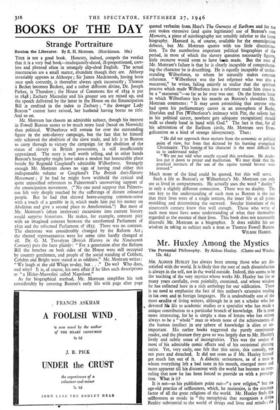BOOKS OF THE DAY
Strange Portraiture
Buxton the Liberator. By R. H. Mottram. (Hutchinson. 16s.)
Tins is not a good book. Honesty, indeed, compels the verdict that it is a very bad book—inadequately-dated, ill-proportioned, care, less and phrased often in strangely slip-shod English. The actual inaccuracies are a small matter, abundant though they are. Althorp invariably appears as Althorpe ; Sir James Mackintosh, having been mice spelt correctly, is thereafter always spelt incorrectly ; Thomas a Becket becomes Beckett, and a rather different divine, Dr. Joseph Parker, is Theodore • the House of Commons fire of 1834 is put in x84 • ' Zachary Macaulay and his greater son are mixed up, and the speech delivered by the latter in Bie House on the Emancipation Bill is credited in the index to Zachary ; " the dowager Lady Buxton " cannot have existed, her husband having borne no title. And so on.
Mr. Mottram has chosen an admirable subject, though his interest in Fowell Buxton seems to be much more local (based on Norwich) than political. Wilberforce will remain for ever the outstanding figure in the anti-slavery campaign, but the fact that he himself only achieved the abolition of the slave trade, and left it to Buxton to carry through to victory the campaign for the abolition of the status of slavery in British possessions, is still insufficiently appreciated. The story is well worth telling, and in other hands Buxton's biography might have taken a modest but honourable place beside Sir Reginald Coupland's admirable Wilberforce. Strangely enough Mr. Mottram shows no sign of having read either this indispensable volume or Coupland's The British Anti-Slavery
Movement; he had he might have withheld the cynical and quite unjustified references to Palmerston's unswerving support of the emancipation movement. (" No one need suppose that Palmers- ton felt very deeply touched by the sufferings of distant coloured people. But he had that shrewd horse-couping common-sense with a touch of a gamble in it, which made him put his money on Abolition and give a second place to Amelioration.") But most of Mr. Mottram's (often irrelevant) excursions into current history would surprise historians. He makes, for example, constant play with an imagined contrast between & unreformed Parliament of 1830 and the reformed Parliament of 1833. There was no contrast. The electorate was considerably changed by the Reform Act ; the elected representatives were for some time hardly changed at all. Dr. G. M. Trevelyan (British History in the Nineteenth Century) puts the facts plainly : " For a generation after the Reform Bill the benches on both sides of the House were still occupied by country gentlemen, and people of the social standing of Cobbett, Cobden and Bright were stared at as oddities." Mr. Mottram writes : " We laugh at the old Whigs to-day, but . . ." Do we? Who does, and why? It is, of course, his own affair if he likes such descriptions as " a Hitler-Mussolini called Napoleon."
As for biographical method, Mr. Mottram simplifies his task considerably by covering Buxton's early life with page after page
quoted verbatim from,- Hare's The Gurneys of Earlham and for tne rest makes extensive (and quite legitimate) use of Buxton's own Memoirs, a piece of autobiography not sensibly inferior to the latest biography. Hansard is, of course, available for the emancipation debates, but Mr. Mottram quotes with too little discrimina- tion. To the numberless important political biographies of the period, in most of which the slavery question necessarily figures, little recourse would seem to have been. made. But the root of Mr. Mottram's failure, is that he is clearly incapable of comprehend.. ing the character he is describing. He is equally incapable of under- standing Wilberforce, to whom he naturally makes constant reference. " Wilberforce was the last refyrmer who was also a macaroni," he writes, failing entirely to realise that the spiritual process Which made Wilberforce into a reformer made him cease to be a " macaroni "—so far as he ever was one. On the historic letter in which Wilberforce lays his mantle on Buxton's shoulders Mr. Mottram comments : " It may seem astonishing that anyone who had spent his parliamentary career in an atmosphere of Burke, Sheridan and Fox [Wilberforce's intimacy with Pitt, the salient fact in his political career, nowhere gets adequate recognition] should walk so closely hand in hand with God." The fact is that, for all his admiration of the Earth= circle, Mr. Mottram sees Evan- gelicanism as a kind of strange idiosyncracy. Thus : " He did not approach these matters from the economic or political point of view, but from that dictated by his burning evangelical Christianity. This leaning of his character is the most difficult for us to understand today." " We are not told what exactly caused this revelation. He doubt- less put it down to prayer and meditation. We may think that the practical instincts of the son of the squire turned brewer were aroused."
Much mose of the kind could be quoted, but this will serve.
Such a life as Buxton's or Wilberforce's Mr. Mottram can only see as lived in compartments. He actually uses the word " duality " in only a slightly different connection., There was no duality. The one key to the understanding of such men as Buxton is the fact that their lives were of a single texture, the inner life at all points moulding and determining the outward. Secular historians of the nineteenth century knew that well enough. Those who write of such men must have some understanding of what they themselves regarded as the essence of their lives. This book does not necessarily discredit Mr. Mottram as a biographer. It does exhibit his un- wisdom in taking as subject such a man as Thomas Fowell Buxton.
WILSON HARRIS.


























 Previous page
Previous page